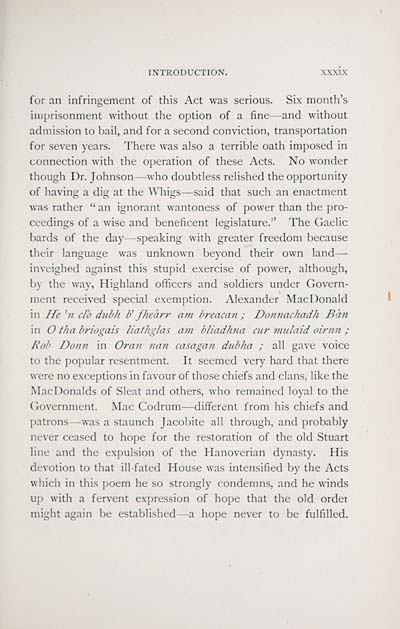Hew Morrison Collection > Poems and songs of John MacCodrum, Archibald MacDonald, and some of the minor Uist bards
(57)
Download files
Complete book:
Individual page:
Thumbnail gallery: Grid view | List view

INTRODUCTION. XXXIX
for an infringement of this Act was serious. Six month's
iini)risonment without the option of a fine — and without
admission to bail, and for a second conviction, transportation
for seven years. There was also a terrible oath imposed in
connection with the operation of these Acts. No wonder
though Dr. Johnson — who doubtless relished the opportunity
of having a dig at the Whigs — said that such an enactment
was rather " an ignorant wantoness of power than the pro-
ceedings of a wise and beneficent legislature." The Gaelic
bards of the day — speaking with greater freedom because
their language was unknown beyond their own land —
inveighed against this stupid exercise of power, although,
by the way, Highland officers and soldiers under Govern-
ment received special exemption. Alexander Mac Donald
in He '« do dubh f fheàrr am breacan ; Donnachadh Ban
in O tha briogais liathglas am bliadhna cur midaid oirnn ;
Rob Donn in Ora7i fian casagan dubha ; all gave voice
to the popular resentment. It seemed very hard that there
were no exceptions in favour of those chiefs and clans, like the
MacDonalds of Sleat and others, who remained loyal to the
(Government. Mac Codrum — difi'erent from his chiefs and
patrons — was a staunch Jacobite all through, and probably
never ceased to hope for the restoration of the old Stuart
line and the expulsion of the Hanoverian dynasty. His
devotion to that ill-fated House was intensified by the Acts
which in this poem he so strongly condemns, and he winds
up with a fervent expression of hope that the old order
might again be established — a hope never to be fulfilled.
for an infringement of this Act was serious. Six month's
iini)risonment without the option of a fine — and without
admission to bail, and for a second conviction, transportation
for seven years. There was also a terrible oath imposed in
connection with the operation of these Acts. No wonder
though Dr. Johnson — who doubtless relished the opportunity
of having a dig at the Whigs — said that such an enactment
was rather " an ignorant wantoness of power than the pro-
ceedings of a wise and beneficent legislature." The Gaelic
bards of the day — speaking with greater freedom because
their language was unknown beyond their own land —
inveighed against this stupid exercise of power, although,
by the way, Highland officers and soldiers under Govern-
ment received special exemption. Alexander Mac Donald
in He '« do dubh f fheàrr am breacan ; Donnachadh Ban
in O tha briogais liathglas am bliadhna cur midaid oirnn ;
Rob Donn in Ora7i fian casagan dubha ; all gave voice
to the popular resentment. It seemed very hard that there
were no exceptions in favour of those chiefs and clans, like the
MacDonalds of Sleat and others, who remained loyal to the
(Government. Mac Codrum — difi'erent from his chiefs and
patrons — was a staunch Jacobite all through, and probably
never ceased to hope for the restoration of the old Stuart
line and the expulsion of the Hanoverian dynasty. His
devotion to that ill-fated House was intensified by the Acts
which in this poem he so strongly condemns, and he winds
up with a fervent expression of hope that the old order
might again be established — a hope never to be fulfilled.
Set display mode to: Large image | Transcription
Images and transcriptions on this page, including medium image downloads, may be used under the Creative Commons Attribution 4.0 International Licence unless otherwise stated. ![]()
| Early Gaelic Book Collections > Hew Morrison Collection > Poems and songs of John MacCodrum, Archibald MacDonald, and some of the minor Uist bards > (57) |
|---|
| Permanent URL | https://digital.nls.uk/81340447 |
|---|
| Description | A selection of items from a collection of 320 volumes and 30 pamphlets of literary and religious works in Scottish Gaelic. From the personal library of Hew Morrison, the first City Librarian of Edinburgh. |
|---|
| Description | Selected items from five 'Special and Named Printed Collections'. Includes books in Gaelic and other Celtic languages, works about the Gaels, their languages, literature, culture and history. |
|---|

